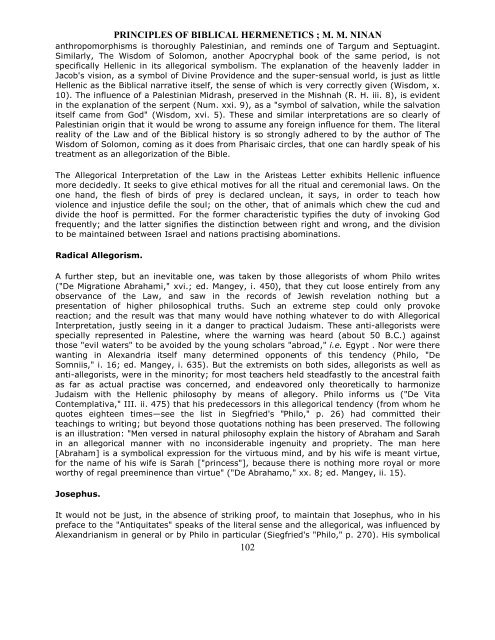Biblical Hermeneutics
You also want an ePaper? Increase the reach of your titles
YUMPU automatically turns print PDFs into web optimized ePapers that Google loves.
PRINCIPLES OF BIBLICAL HERMENETICS ; M. M. NINAN<br />
anthropomorphisms is thoroughly Palestinian, and reminds one of Targum and Septuagint.<br />
Similarly, The Wisdom of Solomon, another Apocryphal book of the same period, is not<br />
specifically Hellenic in its allegorical symbolism. The explanation of the heavenly ladder in<br />
Jacob's vision, as a symbol of Divine Providence and the super-sensual world, is just as little<br />
Hellenic as the <strong>Biblical</strong> narrative itself, the sense of which is very correctly given (Wisdom, x.<br />
10). The influence of a Palestinian Midrash, preserved in the Mishnah (R. H. iii. 8), is evident<br />
in the explanation of the serpent (Num. xxi. 9), as a "symbol of salvation, while the salvation<br />
itself came from God" (Wisdom, xvi. 5). These and similar interpretations are so clearly of<br />
Palestinian origin that it would be wrong to assume any foreign influence for them. The literal<br />
reality of the Law and of the <strong>Biblical</strong> history is so strongly adhered to by the author of The<br />
Wisdom of Solomon, coming as it does from Pharisaic circles, that one can hardly speak of his<br />
treatment as an allegorization of the Bible.<br />
The Allegorical Interpretation of the Law in the Aristeas Letter exhibits Hellenic influence<br />
more decidedly. It seeks to give ethical motives for all the ritual and ceremonial laws. On the<br />
one hand, the flesh of birds of prey is declared unclean, it says, in order to teach how<br />
violence and injustice defile the soul; on the other, that of animals which chew the cud and<br />
divide the hoof is permitted. For the former characteristic typifies the duty of invoking God<br />
frequently; and the latter signifies the distinction between right and wrong, and the division<br />
to be maintained between Israel and nations practising abominations.<br />
Radical Allegorism.<br />
A further step, but an inevitable one, was taken by those allegorists of whom Philo writes<br />
("De Migratione Abrahami," xvi.; ed. Mangey, i. 450), that they cut loose entirely from any<br />
observance of the Law, and saw in the records of Jewish revelation nothing but a<br />
presentation of higher philosophical truths. Such an extreme step could only provoke<br />
reaction; and the result was that many would have nothing whatever to do with Allegorical<br />
Interpretation, justly seeing in it a danger to practical Judaism. These anti-allegorists were<br />
specially represented in Palestine, where the warning was heard (about 50 B.C.) against<br />
those "evil waters" to be avoided by the young scholars "abroad," i.e. Egypt . Nor were there<br />
wanting in Alexandria itself many determined opponents of this tendency (Philo, "De<br />
Somniis," i. 16; ed. Mangey, i. 635). But the extremists on both sides, allegorists as well as<br />
anti-allegorists, were in the minority; for most teachers held steadfastly to the ancestral faith<br />
as far as actual practise was concerned, and endeavored only theoretically to harmonize<br />
Judaism with the Hellenic philosophy by means of allegory. Philo informs us ("De Vita<br />
Contemplativa," III. ii. 475) that his predecessors in this allegorical tendency (from whom he<br />
quotes eighteen times—see the list in Siegfried's "Philo," p. 26) had committed their<br />
teachings to writing; but beyond those quotations nothing has been preserved. The following<br />
is an illustration: "Men versed in natural philosophy explain the history of Abraham and Sarah<br />
in an allegorical manner with no inconsiderable ingenuity and propriety. The man here<br />
[Abraham] is a symbolical expression for the virtuous mind, and by his wife is meant virtue,<br />
for the name of his wife is Sarah ["princess"], because there is nothing more royal or more<br />
worthy of regal preeminence than virtue" ("De Abrahamo," xx. 8; ed. Mangey, ii. 15).<br />
Josephus.<br />
It would not be just, in the absence of striking proof, to maintain that Josephus, who in his<br />
preface to the "Antiquitates" speaks of the literal sense and the allegorical, was influenced by<br />
Alexandrianism in general or by Philo in particular (Siegfried's "Philo," p. 270). His symbolical<br />
102


















